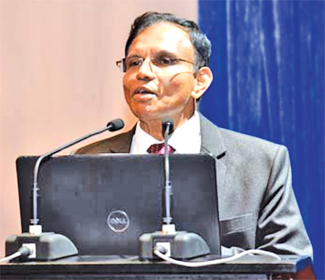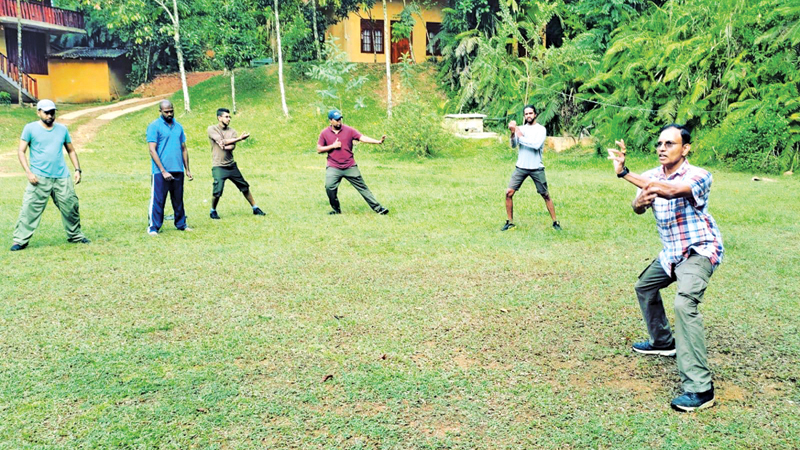 “Ecotourism isn’t just about responsible travel; it’s about transforming how we interact with the world,” says Dr. Sunil Kariyakarawana, one of the pioneers of Mindfulness-Based Ecotourism (MBET) in Sri Lanka. “With MBET, we’re not just preserving nature, we are also healing our minds.”
“Ecotourism isn’t just about responsible travel; it’s about transforming how we interact with the world,” says Dr. Sunil Kariyakarawana, one of the pioneers of Mindfulness-Based Ecotourism (MBET) in Sri Lanka. “With MBET, we’re not just preserving nature, we are also healing our minds.”
As Sri Lanka’s first Buddhist Chaplain to Her Majesty’s British Armed Forces and a mindfulness expert with over 14 years of experience advising the British military, including King Charles, Dr. Kariyakarawana combines mindfulness with traditional ecotourism. “The stress of modern life leaves people stuck on autopilot,” he said. “MBET encourages them to slow down, pay attention, and experience life fully.” The Kandy Octagon and Sinharaja Eco Lodge are central to this vision, two key locations in Sri Lanka where MBET principles come to life under the guidance of Dr Kariyakarawana. While The Kandy Octagon blends mindfulness with the cultural and spiritual essence of Kandy, Sinharaja Eco Lodge immerses participants in the biodiversity of the Sinharaja Rainforest, offering profound sensory and meditative experiences.
Reimagining ecotourism: The philosophy of MBET

Dr. Sunil Kariyakarawana
When asked how MBET differs from the traditional ecotourism approach, he said that traditional ecotourism is about minimising harm to the environment while benefiting local communities, but MBET takes it further by integrating mindfulness into every activity, promoting mental health and wellbeing for everyone involved. He said, “Ecotourism is broadly defined as ‘responsible tourism that leads to conservation and preservation of the environment whilst letting target communities reap the benefits of tourism.’ This includes minimising the effects of travel, reducing the use of plastics, and limiting disruptions to natural habitats.
MBET goes beyond these principles by addressing mental health and wellbeing alongside environmental preservation.” Sri Lanka, with its over 2,000-year-old Buddhist heritage, is uniquely positioned to lead this initiative. “We’ve preserved these mindfulness teachings for centuries,” he says. “It’s time we share them with the world through tourism.”
Asked what inspired him to create MBET, Dr. Kariyakarawana reflected on his decades in the West. “I saw the mental health crisis first hand,” he said. “Before Covid-19, nearly 400 million people were on antidepressants. Imagine what the numbers are now! The relevance of mindfulness comes from increasingly stressful lifestyles exacerbated by post-Covid blues and the calamitous world we are living in.
So much so that we have no time to ‘stand and stare,’ as Shakespeare once said.Having lived in Western countries for the past 30-35 years, I have now realised the true predicament of humanity, not just in the West but all over the world. Research conducted by the Oxford Mindfulness Centre (OMC) in the UK found that close to 400 million people (this is pre-Covid) are on antidepressants regularly. This trend is increasing. Mindfulness has become a billion-dollar industry, and it has been integrated into many aspects of people’s lives. In the UK alone, it has been incorporated into education, the criminal justice system, healthcare, and workplaces. Around the world, people are discussing how to integrate it into more activities, such as tourism.”
Integration of mindfulness into Ecotourism
 “People think mindfulness is about sitting still, but it’s much more than that,” Dr. Kariyakarawana said. “As the Buddha said in the Mindfulness-Establishment Sutta, mindfulness is all-pervasive. You can practise it while walking, eating, or even doing business in the washroom!”
“People think mindfulness is about sitting still, but it’s much more than that,” Dr. Kariyakarawana said. “As the Buddha said in the Mindfulness-Establishment Sutta, mindfulness is all-pervasive. You can practise it while walking, eating, or even doing business in the washroom!”
He said: “It’s about paying attention on purpose and without judgment to what you’re doing. Imagine walking through a rainforest and truly seeing the trees, hearing the streams, and feeling the ground beneath your feet. That’s mindfulness in action.”
He stresses the importance of breaking away from autopilot living. “Most people shower while mentally preparing for a meeting or drive to work with their minds elsewhere until an accident snaps them back to reality. Attention training without time travel is so important, especially in today’s busy world when we must make crucial decisions within a split second. Many accidents (both physical and verbal) happen when we are ‘caught out’ during these ‘auto-pilot’ modes. MBET helps break these habits.”
Healing through sensory connection
“Humans have become disconnected from their senses,” Dr. Kariyakarawana said. “We look but don’t see, listen but don’t hear, eat but don’t taste. It’s a dangerous trend, especially in today’s digital age.”
To combat this, MBET emphasises sensory immersion. “At the Sinharaja Eco Lodge we take a walk in Sinharaja rainforest, notice the intricate details of the flora, hear the soothing sounds of streams, feel the earth under your feet. It’s not just sightseeing; it’s awakening your senses.”
“This is essential in today’s world, where stress, anxiety, and depression are rampant. Sensory immersion through mindfulness can bring people back to the present moment and offer profound healing,” he added.
Mental health and mindfulness
“MBET is more than a tour; it’s a meditative journey,” Dr. Kariyakarawana said. “It addresses stress, anxiety, and depression while immersing participants in nature.”
He compares MBET to spiritual tourism in India, where retreats promise rejuvenation through yoga and meditation. “But MBET is uniquely Sri Lankan,” he says. “We blend mindfulness with our biodiversity and cultural heritage.”
Sensory connection development
 When asked about specific activities that enhance sensory connections, Dr. Kariyakarawana said: “Humans are creatures of habit, and our sensory habits have dulled. We miss half of what we see or hear, and we’ve lost the ability to truly taste our food or feel the ground we walk on.”
When asked about specific activities that enhance sensory connections, Dr. Kariyakarawana said: “Humans are creatures of habit, and our sensory habits have dulled. We miss half of what we see or hear, and we’ve lost the ability to truly taste our food or feel the ground we walk on.”
“For example,” he said, “at MBET destinations like Sinharaja, participants are guided to engage their senses fully. They hear the rustling of leaves, see the vibrant colours of flora, and feel the coolness of streams. These activities counter sensory disconnection and restore a sense of wonder.”
The impact on global mental health
“Countries like India have long hosted spiritual tourism for mental health,” Dr. Kariyakarawana said. “MBET offers a similar promise but with a Sri Lankan twist—blending mindfulness with our unique biodiversity.”
“Our primary audience is high-end Western travellers,” Dr. Kariyakarawana explains. “At the World Travel Market in London, we saw immense interest in MBET. Western countries, with their strong demand for ecotourism and wellness, are our key markets.”
“Unfortunately, Sri Lanka’s tourism industry still focuses on tea, beaches, and ruins. MBET is a chance to showcase something innovative and uniquely Sri Lankan. Sustainability is at the heart of MBET,” Dr. Kariyakarawana emphasised. “This isn’t about profiteering. The pricing must be fair, offering real value to both providers and participants,” he added.
He elaborated on the challenges of monetising MBET. “There’s no rigid pricing model. The focus is on fairness and sustainability. Participants must feel valued, and providers must see it as worthwhile. Environmental awareness is integral. Participants learn conservation through hands-on experiences,” he said. “Mindfulness naturally encourages respect for the environment.”
Environmental and ethical awareness
“Mindfulness is not just about being aware of your surroundings,” Dr. Kariyakarawana said. “It’s about fostering moral and ethical values. MBET instills positive standards that participants carry with them long after their journey ends.”
He said, “for instance, participants learn how their actions impact the environment and how they can contribute to conservation efforts. This creates a ripple effect, encouraging sustainable living practices.”
Post-Covid-19 opportunities
“Covid-19 was a wake-up call,” Dr. Kariyakarawana said. “It highlighted the importance of mental health and wellbeing. That’s when MBET truly took shape.”
“Since then, we’ve seen a growing demand for mindfulness-based practices. People want healing, and MBET offers exactly that,” he continued.
A new era for Sri Lankan tourism
“Despite its potential, MBET faces challenges,” Dr. Kariyakarawana admits. “Sri Lanka’s tourism market is heavily reliant on traditional attractions. But with the right marketing, we can position MBET as a global leader in this emerging field.”
He highlighted the importance of collaboration. “Stakeholders—from local communities to international partners—must work together to ensure MBET’s success and sustainability. With MBET, we can redefine tourism,” Dr. Kariyakarawana said. “Sri Lanka has the natural beauty, cultural heritage, and visionary thinkers to lead this movement.”






